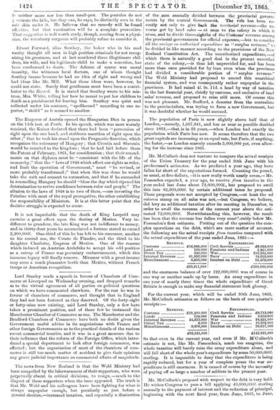Mr. McCulloch does not venture to compare the actual receipts
of the Union Treasury for the year ended 30th June with his predecessor's estimates. As we predicted a year ago, they have fallen far short of the expectations formed. Counting the pound, as usual, at five dollars, —it is now really worth nearly seven,— Mr. Fessenden expected, a year ago, to receive from taxation in the year ended last June about 72,000,0001., but proposed to swell this into 82,000,0001. by certain additional taxes he proposed. These proposals were not accepted by Congress,—at least the ad valorem stamp on all sales was not,—but Congress, we believe, did levy an additional taxation after its meeting in December, in order to swell the revenue of the current year above the esti- mated 72,000,0001. Notwithstanding this, however, the result has been that the revenue has fallen very cons;?...rably below Mr. Fessenden's first estimate. Putting out of the question the com- plex operations on the debt, which are mere matter of account, the following are the actual receipts from taxation compared with the actual expenditure of the year ended Jane, 1865
REVENUE.
EXPENDTCU RE.
Customs £16,985,000 Civil Service 48,958,000 Land 199,000 Pensions and Indiana 2,851,000 Direct Tax 240,000 War 206,264,000 Internal Revenue 41,892,000 Navy 21,618,000 Miscellaneous 6,695,000
Interest on Debt
15,479,000
£65,911,000
£258,060,000
and the enormous balance of over 192,000,0001. was of course in one way or another made up by loans. An army expenditure in one year of nearly three times the whole expenditure of Great Britain is enough to make any financial statement look gloomy.


































 Previous page
Previous page